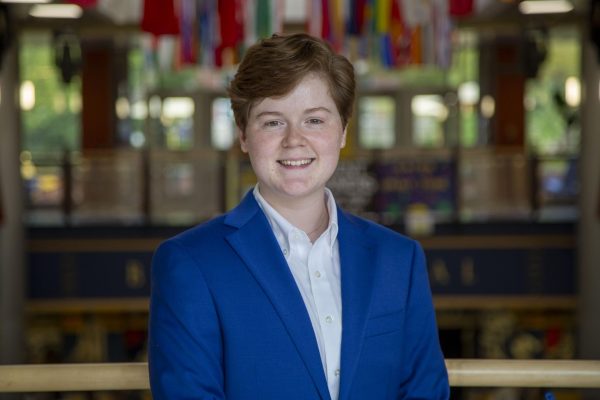A big idea could win you money
A handful of students ate a free pizza for lunch during the first session of the Zingdale Big Idea Competition in the Quigley auditorium on Tuesday, Feb. 14. Run by the Bruce R. Thompson Center for Business and Economics, the competition awards winning students a total of $25,000 for designing a business plan and pitching it to a panel of 15 alumni and faculty members.
“It’s fun for us to watch you folks grow as business people,” said Entrepreneur-in-Residence and Co-Director of the Thompson Center Chris Allison. “It looks great on a resume if you win this stuff. And the cash isn’t bad either. First prize is $10,000.”
The Feb. 14 workshop was titled “Creating a Big Idea” and focused on helping students find a relevant problem to solve.
“I always believe you should look for problems first and solutions second,” Allison said during the event. “A lot of failed entrepreneurs take the attitude of, ‘Build it and they will come.’ That’s a hard way of doing business.”
Allison urged attendees to identify current issues they are passionate about and want to see changed in society. For students who struggled to come up with an issue, Allison recommended trying to identify small annoyances or inconveniences that plague people’s lives and formulating a solution for them.
“It should be doable, and use your common sense,” Allison said. “Put yourself in the brain of your customer and figure out if you were them, how would you — what would you want (as) a product? How would you want to access it? What would you want to pay for it? One of the most important things for a business is empathy.”
There was some discussion about whether entrepreneurs should pursue ideas they feel passionately about or whether they are better off pursuing whatever idea would generate the most profit. Allison said the latter idea is a markets-first approach, in which an entrepreneur would identify a growing market and become an expert in it in order to reap that market’s benefits.
“What do you think the vibe is like of people working in (those) industries in terms of taking risks?” Allison said. “Or the ability to buy something? If it’s a big market that’s growing, that means there’s a lot of money flying around.”
Allison also said that pursuing a markets-first approach and topics you are passionate about do not have to be mutually exclusive.
The competition is open to students of all class years and majors, as well as students from other colleges and universities. Participants can design business plans for any type of business, including non-profits.
Samone Brosier, ’24, won third place in the competition last year and received a $1,000 reward for designing a debt-financing nonprofit that helps people assess how to pay their bills over time so that interest does not accrue at an unmanageable rate.
“My mom, she is a part of a low-income community,” Brosier said. “She works very hard — works overtime. And she actually went to college as well, but she was only able to get an Associate’s degree because the debt she accumulated was so much. She had to drop out. But she’s a very smart woman and she still deals with that debt.”
Brosier is competing again this year and is refining her non-profit business plan.
“If I could eventually put this plan into Pittsburgh, that would be wonderful,” Brosier said. “I’m just taking it one step at a time right now and just seeing where it goes. Seeing what mistakes I make of course and seeing what I can do.”
Reece Smith, ’25, also participated in the competition last year but did not receive any funding for his business. This year, Smith is taking Allison’s ECON 380 Economics of Entrepreneurship II class, which requires its students to participate in the competition as the class’s final project. Smith is going to build on his project from last year, which was designed to create a target end-date fund — a class of mutual fund — that would switch to bonds later in the fund’s life in order to make more money for the investors.
“I’m really doing a lot to try to make this idea more because I’m really passionate about it,” Smith said. “It’s really something that I haven’t stopped thinking about since last year.”
Smith said participating in the competition last year taught him significant persuasive and communication skills that will be useful in his future professional life.
Allison said that while the competition is challenging and work-intensive, it provides students with invaluable hands-on skills and a low-risk environment to experiment with a new trade.
“You’ve got to go out and fail,” Allison said. “I never got good at anything until I screwed it up five times. That’s how you really learn.”
While the number of participants varies each year, Allison anticipates that there will be approximately 20 teams of students.
The breakdown of the $25,000 fund between winners also varies each year, according to Allison. For example, two students tied for first place and two students tied for second place in the 2022 competition.
New to the competition this year, in an endeavor to make the competition more accessible to students not taking an economics class, is that students will no longer be required to submit a 3-5 page executive summary of their business plans. However, Allison encouraged attendees to write one regardless because he said it helps to clarify participants’ goals.
Students will pitch their businesses to the judging panel on April 28, with finalists presenting again on April 29. Allison encouraged participants to take advantage of the opportunity to give a practice pitch to the judging panel on April 27.
Four more workshops will occur over the course of the semester and focus on skills like moving an idea into an implementable plan, marketing, finance management, and pitching a business plan. The next of the four more workshops will take place on March 14 in Quigley 101.

Anna Westbrook is a junior from the Washington, D.C. area. They are majoring in Environmental Science and Sustainability with a concentration in law &...







